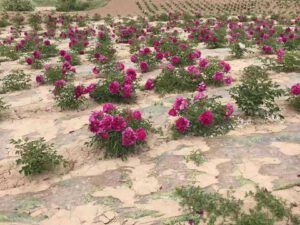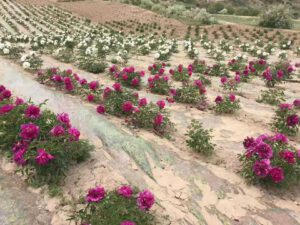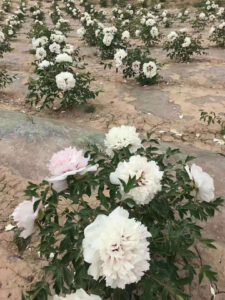Paeonia rockii gets its name from a distinct patch of color at the base of its petals, although wild species are found in Gansu, Shaanxi, Henan and Hubei But the cultivated varieties are mainly concentrated in Wei River, Tao River and the vast areas along the ancient Silk Road in the Daxia River valley in Gansu Province. The cultivated areas are mainly in the provinces of Sichuan, Gansu, Qinghai, Shaanxi and Ningxia (autonomous regions) Therefore also known as the Gansu Peony or northwest peony. In Gansu Province, the cultivation of Paeonia Rockii not only can be traced back to the Tang Dynasty, but also has been cultivated in more than 60% of counties and cities.

Morphological characteristics
Deciduous SHRUB. Stem up to 2 m tall; branches short and thick. Leaves usually twice trifoliate, occasionally 3-foliolate near Shoot Apex; Terminal Leaflets broadly ovate, 7-8 cm long, 5.5-7 cm wide, 3-lobed to middle, lobes unlobed or 2-3-lobed, surface green, glabrous, abaxially Pale Green, sometimes white-powdery, petiolules 1.2-3 cm long, sparsely pubescent or subglabrous along veins; lateral leaflets narrowly ovate or oblong-ovate, 4.5-6.5 cm long, 2.5-4 cm wide, unequal 2-to 3-lobed or undivided, subsessile; Petiole 5-11 cm long, and Leaf axis are glabrous. Flowers Solitary; apex of branches, 10-17 cm in Diam. ; Pedicel 4-6 cm; bracts 5, Oblong, unequal in size; sepals 5, Green, broadly ovate, unequal in size; Petals 5, or double, rose, red-purple, pink-white, usually highly variable, obovate, 5-8 cm long, 4.2-6 cm wide, apex irregularly undulate; Stamens 1-1.7 cm long, filaments purplish red, pink, upper white, Ca. 1.3 cm long, anthers oblong, 4 mm long; Lathe faceplate leathery, cup-shaped, purplish red Apex with several sharp teeth or Lobes, completely enveloping carpels, dehiscing when carpels are mature; carpels 5, more sparse, densely pilose. Something something oblong, densely covered with Yellowish Brown bristles. Flowering May; fruiting June.
The difference with Peony: Petal Inside Face Base Ministry has deep Purple Patch. Leaves bipinnate to triplex, leaflets undivided, 2-4-lobed. The Flower is big, the petal is white.

Range of distribution
Distributed in northern Sichuan, southern Gansu, southern Shaanxi (Taibai mountains) . Wild species are found in undergrowth shrubs on hillsides at elevations of 1100-2800 M. In Gansu, Qinghai and other places have cultivation.
Growth Characteristics
Paeonia rockii is one of the best cultivars in China. It is very different from Central Plain Paeonia Rockii, such as Heze, Shandong and Luoyang.
Gansu Paeonia Rockii, named for the large Purple Patches and Purple Erythema at the base of its petals, is native to the remnant forests in the Alpine region of Gansu Province. A small number of surviving plants still grow in the mountains at altitudes of 1100-3200 meters. The lowest winter temperatures in these areas are generally-30 °C and in some areas-38 °C, so the species is naturally resistant to cold.

Gansu Paeonia Rockii almost all show the basic characteristics of paeonia rockii: Plant Tall, Shuxinqiang, long branch spacing, high growth, some varieties of the same year branches can be as long as 70 cm. The plant height is more than 1 meter (some varieties are as high as 3 meters) , the number of small leaves is more than 15, the leaves are smaller (anti-transpiration) , the leaf back is hairy, all varieties have obvious large purple spot and purple red spot at the base of the petals. Most of the anthers and ovaries are yellow-white or white, and some of the anthers are purplish red. The native species of Central Plain Peony are derived from the female parent of the native species from Anhui and other places, and the hybrids of Yangshan Peony from Mount Song County in Central Plain and Dwarf Peony from Jishan in southern Shanxi are the male parent The basic characteristics of Dwarf Tree Peony are: The plant is shorter (usually less than one meter) , the tree is weaker, the internode spacing of branches is shorter, the annual growth is smaller. The Basal number of leaflets is 9(part is 11) , the terminal leaflets are 3-lobed, the other leaflets are mostly deeply notched, the leaf blade is larger, the flower center (including stigma, disk, filament) are mostly purple-red. Because these areas are relatively low altitude, mild climate, cold climate adaptation is not strong, to resist the low temperature of minus 25 °C.
